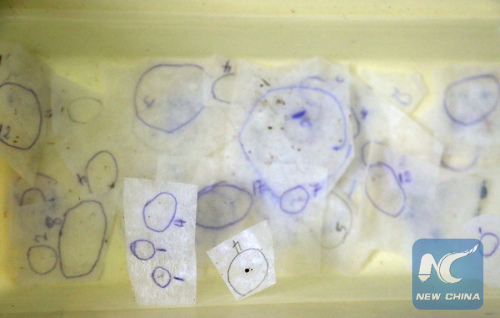
Eggs and larvae of the Aedes aegypti mosquito, the carrier of Zika virus, are displayed in a laboratory of the Ministry of Health, in San Jose, Costa Rica, on Jan. 29, 2016. (Photo: Xinhua/Kent Gilbert)
The Zika virus, thought to be the cause of birth defects known as microcephaly, is "a bit scarier" than scientists initially thought and the first vaccine candidate could be ready for human trials in September, top U.S. health officials said Monday.
"Most of what we're learning is not reassuring," said Anne Schuchat, principal deputy director of the U.S. Centers for Disease Control and Prevention. "Everything we look at with this virus seems to be a bit scarier than we initially thought."
Schuchat said that the Zika virus, that is mainly spread to people primarily through the bite of an infected Aedes species of mosquito, is linked to a broader set of complications in pregnancy, not just microcephaly but also premature birth, eye problems and some other conditions.
Anthony Fauci, director of the U.S. National Institute of Allergy and Infectious Diseases, detailed that Zika may also cause an autoimmune disorder called the Guillain-Barre syndrome, a spinal cord inflammation called acute myelitis, a brain inflammation called Meningoencephalitis, as well as an autoimmune condition called Acute Disseminated Encephalomyelitis, which shares some traits with multiple sclerosis.
"I'm not an alarmist ... but the more we learn about the neurological aspects, the more we look around and say this is very serious," Fauci said.
Both Schuchat and Fauci made the remarks at a White House press briefing, where they were invited to provide an update on this virus and the risk that it poses to the U.S. public.
Schuchat said the Aedes aegypti mosquitoes that spread the virus are present in about 30 U.S. states, instead of 12 states as initially thought.
Meanwhile, the virus is likely to be a problem during much of the pregnancy period, not just the first trimester but potentially throughout the pregnancy, she said.
Fauci said researchers have developed two mouse models to study how Zika infects the neurological tissues, as well as a monkey model that showed that the virus stays around the blood significantly longer in pregnant monkeys than it does in non-pregnant monkeys.
He said it's "very likely" the first vaccine candidate, which is being produced in a pilot plant outside of Bethesda, Maryland, where his agency is situated, could be available for human trials in September.
In addition, U.S. researchers have screened about 62 Zika drugs, 15 of which "have some degree of activity," Fauci said.
Currently, there is no vaccine to prevent or medicine to treat the Zika disease, which is usually mild with symptoms lasting from several days to a week in humans.


















































